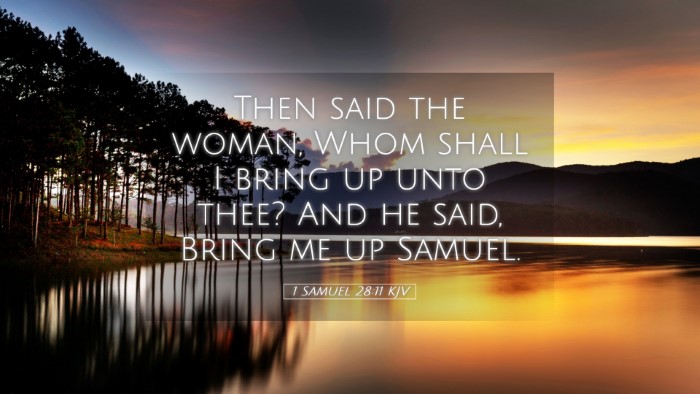1 Samuel 28:11 Commentary
Verse: “Then said the woman, Whom shall I bring up unto thee? And he said, Bring me up Samuel.”
Introduction
The narrative of 1 Samuel 28 is one of the most intriguing and complex passages in the Old Testament, as it involves the account of King Saul seeking guidance from the deceased prophet Samuel through a medium. This commentary will delve into the theological, historical, and practical implications of this verse, drawing insights from public domain commentaries.
Contextual Background
The context of this verse is set against the backdrop of Saul’s declining reign as king of Israel. He had previously been rejected by God due to his disobedience (1 Samuel 15:26), and now he finds himself facing an impending battle with the Philistines. In desperation, Saul seeks after worldly means of obtaining wisdom, illustrating a stark contrast between divine guidance and human folly.
Historical Context
Saul’s actions by consulting a medium reflect a significant shift in his character and leadership. When he first became king, he was chosen for his humble beginnings and reliance on God. However, as he grew increasingly anxious and paranoid, his decisions led him away from divine direction. This speaks volumes about the dangers of turning to illicit sources for guidance, especially in times of uncertainty.
Theological Analysis
This verse raises profound theological questions regarding the nature of communication with the dead and the consequences of engaging with occult practices. The engagement of the medium to call upon Samuel can serve as both a warning and a lesson about the seriousness of spiritual authority and God’s will.
Mediumship and Spiritual Consequences
1. Condemnation of Witchcraft:
The Scriptures are clear in their condemnation of witchcraft and mediums. In Deuteronomy 18:10-12, God commands His people to avoid such practices, indicating that they are an abomination. Saul's act of seeking this guidance directly contradicts the command of God and ultimately contributes to his downfall.
2. God’s Sovereignty:
Despite Saul’s disobedience, God allows Samuel to be brought forth from the dead. This indicates God’s sovereignty over life and death, and His authority even in matters that seem contrary to His law. It also illustrates the tragic irony that even in seeking God through disobedient means, Saul meets with the judgment of God, as Samuel does not offer a favorable response.
Spiritual Implications for Believers
The choice of Saul to consult a medium serves as a cautionary tale for believers today. It embodies the struggle between faith and fear, illustrating the temptation to seek answers outside of God's ordained channels.
- Reliance on God: The passage emphasizes the need for faithful reliance on God, especially in areas of uncertainty. Believers are reminded of Proverbs 3:5-6, which calls them to trust in the Lord with all their heart.
- The Dangers of Desperation: Saul's desperation leads him to sinful decisions, highlighting how fear can lead individuals away from God's truth. It serves as a reminder to seek God earnestly in prayer and the Word, rather than resorting to worldly solutions.
- Power of Repentance: Ultimately, Saul's failure to repent and turn back to God is a key lesson. It reinforces the idea echoed throughout Scripture that God desires mercy and repentance over sacrifice.
Commentary Insights
Matthew Henry's Commentary
Matthew Henry offers a deep reflection on the nature of Saul's sin and the consequences that follow. He notes that the seeking of counsel from a medium is a sign of Saul’s complete alienation from God. Henry emphasizes the irony of Saul’s predicament - the very man he seeks is the one who had already delivered God’s judgment upon him. This serves as a warning regarding the futility of seeking wisdom apart from God.
Albert Barnes' Notes on the Bible
Albert Barnes provides a detailed analysis of the text, particularly focusing on the dialogue between Saul and the medium. He points out that the woman’s surprise upon seeing Samuel indicates she was not accustomed to what transpired, thus aligning with the text’s emphasis on the miraculous nature of Samuel's appearance. He also underscores the tragic dimensions of Saul’s reliance on human means for divine understanding, viewing this action as leading to hopelessness and despair.
Adam Clarke's Commentary
Adam Clarke offers insights into the cultural significance of necromancy and its implications for the Israelite community. He stresses that Saul’s actions symbolize a complete breakdown of faith, as he seeks counsel from a medium instead of turning to the God he had forsaken. Clarke also notes the importance of the subsequent message delivered by Samuel, which reiterates the certainty of Saul’s impending downfall due to his unfaithfulness.
Conclusion
The account in 1 Samuel 28:11 serves as a profound reminder of the importance of seeking God’s wisdom through lawful and honorable means. The interplay between disobedience, desperation, and divine judgment illustrates the weighty consequences of turning against God’s precepts. It calls pastors, students, theologians, and scholars alike to reflect on the ways they seek wisdom and guidance, encouraging a return to the scriptures and prayer as the primary avenues for divine communication.
Reflection Questions
- In what ways can we ensure we are seeking God's guidance in our decision-making processes?
- How can we identify areas where we might be tempted to seek worldly wisdom over divine insight?
- What lessons can be drawn from Saul’s decline that apply to current leadership and spiritual life?


